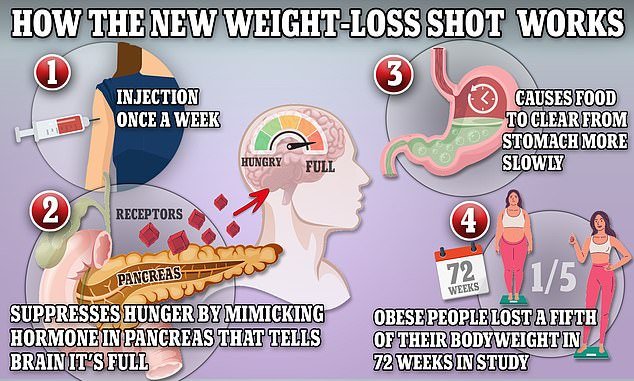Everything you need to know about ‘game-changing’ weight loss jab WeGovy
A weight-loss jab beloved by Hollywood A-listers has been given the green light to be offered on the NHS to Brits struggling to slim down.
But is semaglutide, sold under the brand name Wegovy, the panacea it is?
Who is eligible to take it? And what are the possible side effects?
Here, MailOnline explains everything you need to know about WeGovy and its cousin Ozempic.
Semaglutide, marketed as Wegovy for overweight or obese people, is approved for use in the NHS

Wegovy and Ozempic work by prompting the body to produce a hormone called glucagon-like peptide-1 that is naturally released from the gut after meals
What is semaglutide and how does it work?
Semaglutide belongs to a group of drugs known as GLP-1s.
They are a synthetic form of a hormone naturally released by the body when you eat that stimulates the release of insulin, a chemical that helps control blood sugar levels.
It also slows the rate at which the stomach empties and tells the brain to increase the sense of how full you feel and decrease your appetite.
What is the difference between Ozempic and Wegovy?
Confusingly, semaglutide is branded as two separate drugs, both of which are made by Danish pharmaceutical giant Novo Nordisk.
Ozempic is aimed at patients with type 2 diabetes.
It lowers their blood sugar and reduces the risk of heart attacks and strokes in those who also have heart disease.
Sister drug Wegovy is packed with a more potent dose of semaglutide and instead targets people who weigh too much.
Will I be able to get Wegovy?
Wegovy will be available to people with a BMI of 35 or more – a classification that means they are morbidly obese.
Patients must also have at least one weight-related comorbidity, such as type 2 diabetes, to be eligible.
Adults with a BMI between 30 and 35 may also be recommended the drug if they have been referred for specialist help, according to guidelines from the NHS watchdog, the National Institute for Health and Care Excellence.
Would I be able to get it privately then?
Private clinics in the UK can give customers Ozempic off-label for just under £200 a month.
However, doctors have said that off-label prescribing is “highly unreliable territory” as doctors are not allowed to advertise drugs for a treatment that is outside the product license.
Novo Nordisk has warned that it does not support off-label prescribing, which could limit supply for type 2 diabetes patients who are prescribed the medication.
Are there side effects?
Like all medications, semaglutide is not without risk.
Users often complain of nausea, constipation, and diarrhea, while some also experience acid indigestion, fatigue, and complain that food tastes different after taking the drug.
It’s this side effect that some people attribute to their continued weight loss – making their favorite junk food taste bad.


Top Gear presenter Jeremy Clarkson (left) revealed that he used Ozempic to lose weight. When asked in October whether following a healthier diet or going to the gym was the cause of his 30-pound (13.6 kg) weight loss, Elon Musk (right) cited “fasting” and “Wegovy”

Rumor has it that Kim Kardashian used Wegovy to lose weight quickly to fit into Marilyn Monroe’s famous ‘Happy Birthday Mr President’ dress at the 2022 Met Gala (pictured)
Thyroid cancer, pancreatitis – when the organ becomes inflamed – and kidney failure are rare but serious side effects.
Patients have also warned that their face looks thin, exhausted and old – a side effect that has been labeled “Ozempic face.”
But Avideh Nazeri, medical director of Novo Nordisk UK, says they can be limited by only gradually increasing the dose a patient takes.
Will I gain weight again if I stop?
Possible.
Research suggests that when people stop taking the drug, they gain weight again as their appetite returns, so you may need to continue taking this drug for the rest of your life.
This is because the drug works by signaling satiety to the brain and suppressing appetite, so once a person stops taking the drug, their previous eating habits may return.
However, if people made significant lifestyle changes to combat weight gain while taking the drug, they could maintain a healthier weight.
Can I take a pill instead?
Although a pill form of semaglutide was launched in the UK last year, this is a formulation to treat diabetes.
So far, there are no studies on its use as a weight loss aid – in fact, don’t hold your breath.
Is it groundbreaking?
Tam Fry, from the National Obesity Forum, said semaglutide was “the weight loss drug we’ve been waiting for” and urged health leaders to ration supplies to those who need it most.
He said, ‘It’s a game changer and so successful that Hollywood A-listers are now using it to slim down and show off their figure.
“The real danger is that there won’t be enough to go around any time soon.
“You shouldn’t use it just to lose a few pounds, because that could jeopardize the health of those who really need it, those with type 2 diabetes and morbid obesity.”
But dietitian Dr Duane Mellor, from Aston Medical School, Aston University, urged caution, saying the drug was not a ‘miracle cure’ for obesity. He said: ‘It’s important to remember that semaglutide works alongside and supports healthy lifestyle changes, and when people are offered semaglutide, they also receive ongoing support to make and maintain these changes in terms of diet and lifestyle.

A British study found that people taking Wegovy lost weight quickly, losing 18% of their weight over 68 weeks. They regained two-thirds of that weight, or 12% of their original body weight in the year after they dropped the weekly injections. Experts say the drug should be used for a lifetime to keep the pounds off
‘As all individuals initially offered semaglutide through the NHS will be supported by specialist weight management services, including support from a specialist dietitian.’
What other weight loss drugs are available on the NHS?
Two other weight loss drugs are available on the NHS – orlistat and liraglutide.
Orlistat is a pill taken up to three times a day that prevents fat from being absorbed by the digestive system.
The undigested fat is instead passed out of the body as stool.
While this will stop people from gaining weight, it will not help them lose the weight on their own.
Side effects include greasy or oily poop, oily discharge from the rectum, and high levels of flatulence.
Liraglutide is an injectable drug that is given daily and works in a similar way to semaglutide by altering the body’s metabolism, making the person feel fuller and less hungry.
This leads to them eating less and, in theory, losing weight.
Liraglutide is generally only prescribed after a GP has referred you to a specialist weight loss service and when orlistat has not worked.
Side effects include apain, diarrhoea, fever, frequent urination and trouble sleeping.

